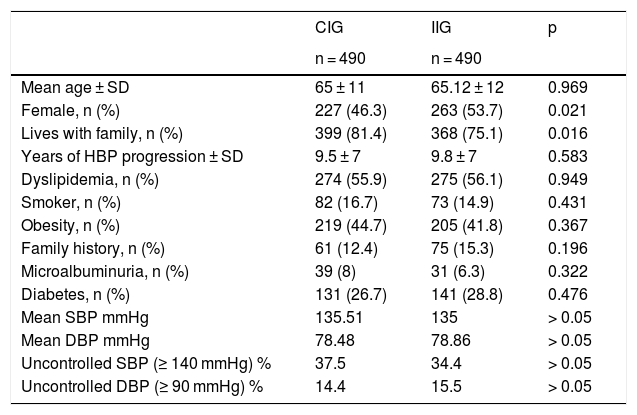Hypertension is one of the main cardiovascular risk factors. An educational intervention, aimed at increasing or reinforcing the patient's knowledge, can contribute to better control of their blood pressure. Our goal was to evaluate the efficacy of a continuing therapeutic education versus an initial intervention in hypertensive patients.
MethodsExperimental study of multicenter community intervention, through the application of a therapeutic education program in hypertension.
Results980 patients on antihypertensive treatment were included, 490 in each group, with a mean age of 65 years, and 50% women, baseline mean SBP in both groups was136 mmHg. Regarding knowledge about hypertension, although a similar initial improvement was observed in both groups, at the end of the study, in the continuous intervention group (CIG) an average of 23.06 correct answers was observed, while in the Initial intervention group (IIG) the mean was 20.91, being the difference statistically significant (p < 0.001). At the end of the study, the mean SBP was 127.5 mmHg in the CIG and 136.57 mmHg in the IIG group. Likewise, a lower percentage of patients with a BMI ≥25 was observed in the CIG (78.2%) than in the IIG 82.6%, this difference being statistically significant (p < 0.001). This same effect was observed on the abdominal perimeter, observing an increased abdominal perimeter in 46.3% of the CIG compared to 68.8% in the IIG (p < 0.001).
ConclusionA continuous educational intervention increases the degree of knowledge about hypertension compared to an initial intervention. Likewise, this intervention is associated with an improvement in blood pressure, weight, body mass index and abdominal girth figures.
La hipertensión es uno de los principales factores de riesgo cardiovascular. Una intervención educativa, destinada a aumentar o reforzar los conocimientos del paciente, puede contribuir a un mejor control de su presión arterial. Nuestro objetivo fue evaluar la eficacia de una educación terapéutica continuada frente a una intervención inicial en hipertensos.
MétodosEstudio experimental, de intervención comunitaria multicéntrica, mediante la aplicación de un programa de educación terapéutica en hipertensión arterial (HTA).
ResultadosSe incluyeron 980 pacientes en tratamiento antihipertensivo, 490 en cada grupo, con edad media de 65 años, y un 50% mujeres siendo la presión arterial sistólica (PAS) media inicial en ambos grupos de 136 mmHg. Respecto a los conocimientos sobre la hipertensión, aunque se observó una mejoría inicial similar en ambos grupos, al finalizar el estudio, en el grupo de intervención continuado (GIC) se observó una media de 23,06 respuestas acertadas, mientras que en el grupo de intervención inicial (GII) la media fue de 20,91, siendo la diferencia estadísticamente significativa (p < 0,001). Al finalizar el estudio la cifra media de PAS fue de 127,5 mmHg en el GIC y de136.57 mmHg en el grupo GII. Asimismo, se observó un menor porcentaje de pacientes con IMC ≥ 25 en el GIC (78,2%) que en le GII 82,6%, siendo esta diferencia estadísticamente significativa (p < 0,001). Este mismo efecto se observó sobre el perímetro abdominal, observándose en el GIC un perímetro abdominal aumentado en un 46,3% frente a un 68,8% en el GII (p < 0,001).
ConclusiónUna intervención educativa continuada aumenta el grado de conocimiento sobre la hipertensión respecto a una intervención inicial. Asimismo, esta intervención se asocia a una mejoría en las cifras de presión arterial, peso, índice de masa corporal y perímetro abdominal.










